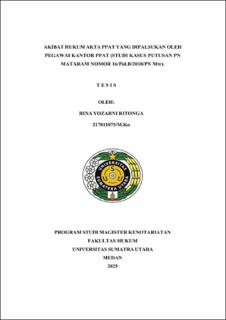Akibat Hukum Akta PPAT yang Dipalsukan oleh Pegawai Kantor PPAT (Studi Kasus Putusan PN Mataram Nomor 16/Pid.B/2018/PN Mtr).
Legal Consequences of PPAT Deeds Forged by PPAT Office Employees (Case Study of Mataram PN Decision Number 16/Pid.B/2018/PN Mtr

Date
2025Author
Ritonga, Rina Yozarni
Advisor(s)
Purba, Hasim
Suhaidi
Suprayitno
Metadata
Show full item recordAbstract
A deed is one of the most important documents required when an individual
claims ownership of an asset, whether movable or immovable. In land ownership,
deeds are indispensable, as their creation serves to provide evidence of legitimate
ownership. Deeds are prepared by Land Deed Officials (PPAT), who are sworn in
to perform their duties professionally and within their legal mandates. In carrying
out their responsibilities, a PPAT often requires assistance from office employees.
However, in practice, some employees of PPAT offices deviate from their duties,
even committing forgery of deeds.
The desire for greater financial gain motivates some PPAT office employees
to engage in actions that harm both the PPAT and their clients, actions that often
fall under the category of criminal document forgery.
This thesis discusses the case that occurred between 2015 and the end of
2016, involving the defendant FERAINTAN PUJIAPRIANI, an employee of the
Notary and Land Deed Official, Ms. NANI SURYANI, S.H., M.Kn. The research
examines the legal process and the status of the forged deeds under the law.
Furthermore, it explores the legal consequences faced by PPAT office employees
who engage in such acts under the applicable laws. This study employs a
normative juridical method, focusing on legislative regulations and previous
research studies.
Collections
- Master Theses (Notary) [2330]
